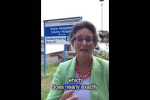Bereaved mums unite to campaign for new drugs policy to avert 'avoidable deaths'. This was published in the Portsmouth News: https://www.portsmouth.co.uk/news/people/bereaved-mums-unite-to-campaig…
Experts on the panel included bereaved mother Hilary Mills and a former undercover police officer Neil Woods, who both support the legalisation and regulation of drugs, and Janine Milburn who aims to educate children about substances.
They are demanding a new approach to drugs.
Outside Waterlooville Community Centre on Friday, a sea of colourful paper flowers represented the thousands of ‘avoidable drugs related deaths’ in 2020 - a display that Meon Valley MP Flick Drummond said was ‘a graphic illustration of the problem’.
Mrs Drummond welcomed guests to the meeting as she promised that the ‘government is taking the drug problem really seriously’ but admitted that ‘we do need a new approach’.
Hilary’s son Ben died at the age of 27 from a heroin overdose. His issues with drugs resulted in a criminal record, leading to employment and mental health problems.
Mum of four Hilary is now a member of the Anyone’s Child network, a group of families who have been negatively impacted by the drugs policy and encourage others to get involved in the discussion around policy reform.
Hilary said: ‘Is it time for a new approach? At present, every year since the so-called war on drugs started, evidence suggests that we are losing.
‘The cost to society is rising. We need to see drug use as a health and social issue.’
The room also heard from Janine Milburn, who lost her daughter Georgia Jones after she took pills at Mutiny Festival in Cosham in 2018.
Through her campaign Don’t Go With The Flo, Janine aims to educate people about drugs, harm reduction and peer pressure.
Janine said: ‘I campaign with the thought of, ‘we can’t stop people trying substances’, but we can take steps.
‘One of these steps is testing and giving proper advice.
‘With front-of-house testing, a third of people will hand that substance over and not use it at all.
‘I believe we need to change the stigma of the substances and can slowly build changes in society.’
Mr Woods spent 14 years infiltrating drug gangs, gaining the trust of some of the violent criminals in Britain.
His experiences led him to see the futility of the war on drugs, and now believes that the policy demonises those who need help.
He said: ‘I represent the classic dividing line in the drugs debate. Let me tell you what it is like for the front line.
‘Police never reduced the size of the market, but we do change the shape of it and that changing shape gets nastier and nastier.
‘It’s a direct result of policing.’
Neil is now on the US board of LEAP (Law Enforcement Action Partnership), an organisation made up exclusively of law enforcement professionals campaigning for drug law reforms, and is chair of LEAP in the UK.
He added: ‘We want an evidence based drugs policy.’
Jane Slater, deputy CEO of Anyone’s Child, agreed that current drugs laws need to be changed.
She added: ‘50 years of a drug war simply isn’t working. I could tell you 100 stories about how this policy has affected people.
‘We need to look at how we regulate this market.’
‘Let’s make Portsmouth an area which is ahead of the curve on the drugs issue. I hope that this will be the start of a number of conversations.’
Another panelist was Peter Krykant, who also brought the UK’s first Overdose Prevention Centre (OPC) that he ran in a converted ambulance in Glasgow.
He has supervised more than 1,000 injections of illegal drugs inside the OPC and treated multiple overdoses with no deaths.
Richard Johnson is CEO at ANA Treatment Centres. He said: ‘We believe in the disease model of addiction. It is not a lifestyle choice.
‘We are helping vulnerable people a chance to live their lives free of drugs and alcohol.’
Dr Adam Holland, a public health doctor, co-chairs the drugs special interest group of the Faculty of Public Health.
He said: ‘We have a real issue with drug related deaths.
‘In the last seven years we have seen increases, every year we have seen a record in the number of drugs deaths. There is a huge human cost.
‘Punitive drug policy says that if you use drugs you’re going to get arrested, and the idea is that will deter people - but that can create more than it is aiming to prevent.’
